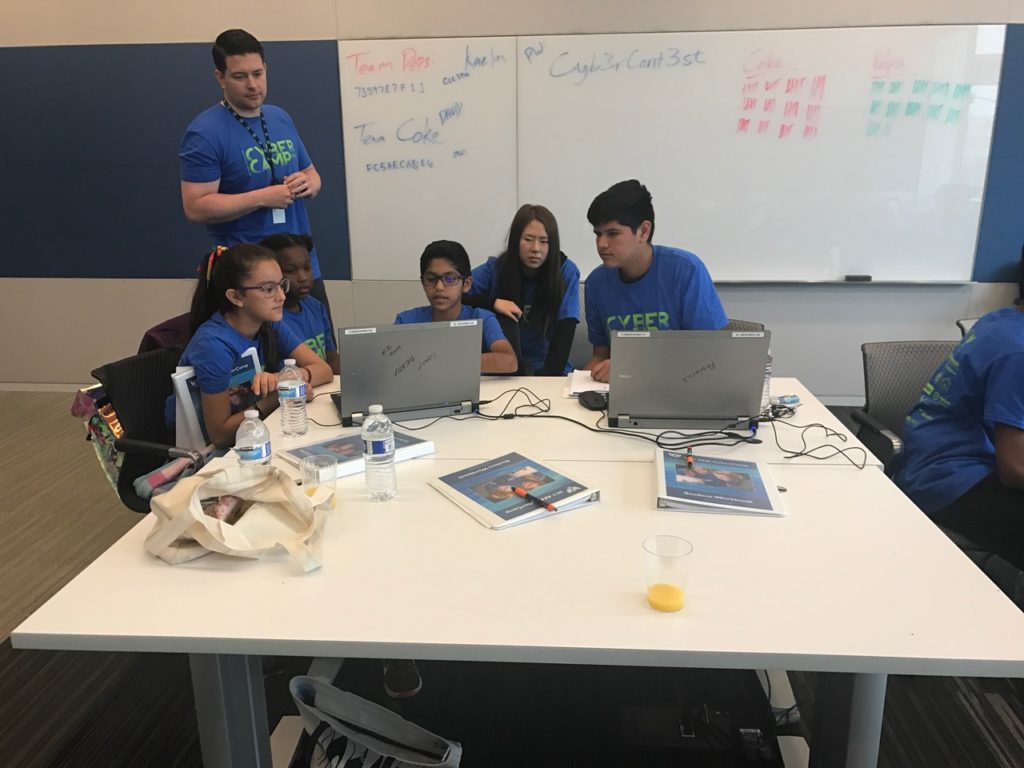CyberCamp teaches kids to keep internet data safe from hacks

Students collaborate on a problem while an instructor looks on at AT&T’s CyberCamp last week. Photo
As modern a 15-year-old, Kayla Harris thought she understood social media. But after a few days at a cybersecurity camp in El Segundo, she wasn’t so sure.
Harris and other local students spent last week at CyberCamp in at the AT&T campus, a joint effort of the telecommunications company and the Air Force Association, an American aerospace nonprofit. The camp featured instruction and online activities about online safety from professionals in the field. Some of the lessons were a bit jarring for kids from a generation accustomed to a porous border between real life and the internet.
“Social media-wise, they told us that it’s very easy to hack into stuff and they showed us how easy it was, and it just made us realize, ‘Oh my gosh,’ we really have to take care of this stuff, and protect our stuff,” Harris said.
With the share of business conducted online increasing, the danger of online threats is growing in tandem, and the significance of cybersecurity is rising. Recent incidents like the WannaCry ransomware attacks have destabilized business-based computer networks around the world. Job opportunities in the field are growing, with more and more private companies wanting to ensure that their information is safe.
This is the camp’s second year of teaching students, and is one of three run throughout the country, with other locations in Colorado Springs, Colo, and another in San Antonio. Jason Baker, an associate director with AT&T, wants the camp to turn the participants towards more STEM-based careers and hobbies.
“It’s the opportunity to really start our younger folks off on the right foot. Our goal, between the Windows and the new language, is to inspire them to move into a STEM career so if they come out of the course saying, ‘I want to learn more about this,’ we’ve done our job,” said Baker, who is also a Lt. Colonel in the U.S. Air Force Reserve.
Students have also been able to make new friends while learning new computer skills.
“The great thing is that on the first day they sit opposite each other, boys on one side girls on the other, and now they’re all integrated together. Watching them turn into a team over a week has been pretty cool,” Baker said.
The camp taught a wide range of students, from kids who know nothing about computers to students who are leaving for college to study computers. Ekam Singh,12, came to the camp with no previous knowledge of computers. But Harris had previously had previously taken several computer-based classes in school.
Both Harris and Singh agreed, though, that camp was successful in their teaching. They said instructors moved at a slower pace to accommodate for the students that were newer to computers, and made activities interactive rather than offering mere lectures.
Ryan Hart, a first-year instructor with the program, said he was pleasantly shocked by the students’ eagerness to learn, as well as their ability to pick up skills quickly.
“I’ve been really impressed by how much they know about computers and cyber security. I was blown away. They know a lot more than my parents, grandparents, even more than me,” Hart said.
The five-day camp focused on a different concept every day, and four instructors are rotated through, depending on the content that was being taught. Among the topics covered were cyberethics and online safety, Windows security policies, Ubuntu terminology, and basic command line security. The first four days emphasized this information in preparation for a competition, known as CyberPatriot, that took place on the final day.
CyberPatriot is a national competition and camp focused on internet security issues and designed encourage kids to consider careers in STEM fields. STEM subjects, in turn, have been the focus of increasing attention from state education authorities, and many area high schools, including Mira Costa and South, have started CyberPatriot clubs of their own. Costa’s CyberPatriot program, founded two years ago, last year placed in the top 5 in the state, and narrowly missed participating in the national championships.
The CyberPatriot competition that transpires during the summer camps is a contest between the students attending the camp. Students are split into two teams and are given a computer per team. The team must then keep the computer secure by doing things such as putting up firewalls, getting rid of viruses, and changing passwords policies.
“You win by getting the highest points, but the way [the instructors] win is if [the students] leave Friday having more knowledge and tools in their toolbelt about how to act responsibly and make smart decisions,” Baker said.

